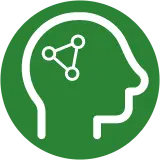We help information technology professionals gain the knowledge and skills to work in IT at every level of every industry. We prepare students for an in-demand career with far-reaching applications. Choose from the following IT degrees:
Associate
Associate of Science in Information Technology
Format: On Campus or Online
Number of credit hours: 60
Gain the tools and skills you need for entry to the IT industry with this associate
degree in information technology. Develop your foundational approach to networking,
programming, database architecture and software development. Apply your learning to several
entry-level IT career paths or continue on to bachelor-level studies in this field.
Bachelor
Bachelor of Science in Information Technology – Cybersecurity
Format: On Campus or Online
Number of credit hours:
120
Help protect your organization’s network capabilities through broad expertise
across cybersecurity and information technology. Cover fundamental IT concepts within
networking, programming, software development and database architecture. Round out core IT
curriculum through specialized studies in cybersecurity topics, such as information systems
security, computer forensics and enterprise networking.
Master
Master of Science in Information Technology – Cybersecurity
Format: On Campus or Online
Number of credit hours:
30
Take your cybersecurity skillset to the next level through a master’s degree in IT
with a specialization in cybersecurity. Focus on advanced coursework in IT concepts, including
information technology architecture and security, database administration and IT project
management. Round out core studies through specialized coursework in intrusion detection and
prevention, security policies and procedures and an information systems security professional
emphasis.
Master of Science in Information Technology – Data Analytics
Format: On Campus or Online
Number of credit hours: 66
Amplify your expertise optimizing data analytics-driven insights through curriculum
that blends key concepts in IT with coursework in data analytics. Further develop your
skillset in predictive analytics, business intelligence, data analytics and decision support
systems, alongside IT topics across database administration, information technology
architecture and security, enterprise administration and more.
Ready to pursue your career-led information technology degree at Salem University?
We’re ready to help you build the future you want.

Salem University has done so much for me throughout my time here. This
has been a place for that had stepped me out of my comfort zone.
Growing up locally, I never truly thought of going to Salem
University, but I am glad I did. As I have received a quality
education, but more importantly lifelong experiences and relationships
along the way. There is no way of paying back all the opportunities
that this school has given me!
Andrew Friend • Graduate

I had an amazing experience at Salem University! The faculty and staff
were supportive and available to help me with anything I needed. The
classes were engaging, and I felt challenged and pushed to do my best.
I also appreciated the diverse student body and the opportunity to
learn from people with different backgrounds and perspectives. I
recommend Salem University to anyone looking for a quality education
and a supportive community.
Yesenia Munoz •
Graduate
Why Salem?
Each of our values is inspired by our core mission to prepare our learners to thrive in their learning and in life. We see education as more than a path to professional expertise—it’s a launchpad for those who go on to meaningfully impact not only their own lives, but their local and global communities through work they are passionate about.

We are committed to innovation and growth

Our innovative programs meet the needs of tomorrow’s workforce.

Our students are focused on career building and real returns on their educational investment.

Cultivating our community partnerships spurs innovation and economic development.

We are committed to making quality career education more accessible to students over the next 7 years.